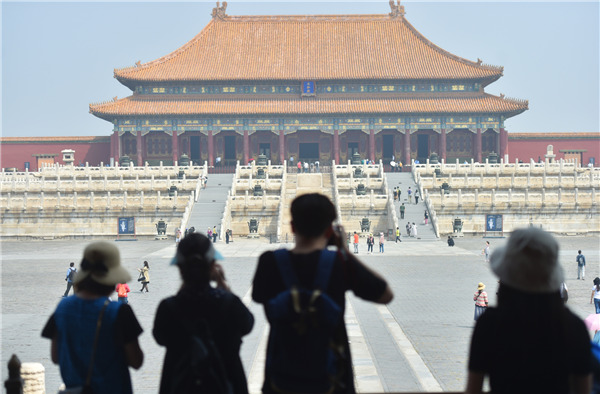Requiring reservations to visit sites may remain widespread


Regulation helps people avoid mass gatherings, stem the spread of virus
After Sunday brunch with friends at Beijing's bustling Wangfujing pedestrian shopping street, Hu Yiting felt it would be a waste of the pleasant spring weather to head back home, crawl into bed and watch TV.
That's when the idea popped into Hu's head to climb nearby Jingshan hill for a bird's-eye view of the city after being cooped up at home for weeks due to the novel coronavirus outbreak.
However, security guards outside the park turned her away because she hadn't made a reservation.
"At first, I was very frustrated about having no chance for any impromptu fun," she said. "But with the novel coronavirus not completely rooted out yet, it's probably best to safeguard public health by making early reservations to visit scenic spots or dine out."
While the nation is maintaining its vigilance amid unwavering epidemic control and prevention efforts, a growing number of people are getting used to the new normal of "no entry without reservations "in many aspects of daily life to avoid mass gatherings and stem the spread of the virus.
During the May Day holiday from May 1 to 5, the first major holiday in China since the easing of the epidemic, reservations were required for visits to many scenic spots around the country.
More than 80 percent of China's top 5A-rated tourist sites required visitors to make reservations via the internet, WeChat accounts or third-party platforms, the Ministry of Culture and Tourism said.
Liu Chang, a gym coach in Beijing, scrambled to make a reservation for the Forbidden City on the eve of the holiday when it announced it was reopening after a three-month closure caused by the epidemic.
Liu, 26, had visited the former imperial palace before but said it was more enjoyable during the holiday, when the number of visitors was capped at 5,000 a day, down from 80,000 before the outbreak.
"It's unbelievable that I was able to slow down and take time to learn and appreciate the history and beauty of the ancient culture and even shoot pictures without a crowd of tourists entirely blocking the buildings," he said. "The strict reservation system, to be frank, really made my day."
Yang Yanfeng, director of the Online Tourism Research Center at Beijing Union University's Tourism College, said requiring reservations has helped scenic spots adjust tourist flows and enhance visitor comfort.
"Typically, people who make reservations, rather than walk-ins, feel more special and cherish their opportunity to visit, which means they are willing to spend more time and energy on in-depth travel," he said. "As a result, it will make their trip more fruitful."
Yang said reservation requirements also play a vital role in helping scenic spots allocate public resources in a more efficient, transparent and fair way, especially during high season, when ticket demand exceeds supply.
Apart from the tourism sector, a wide variety of businesses and venues from barbershops to restaurants and libraries are requiring reservations as part of epidemic control measures.
The National Library of China, which reopened to the public recently with a daily cap of 1,200 visitors after being shut down for months, required people to make real-name reservations on WeChat or by phone.
He Mang, deputy dean of the School of Tourism Management at Sun Yat-sen University, said making reservations is not a new thing in China, having already been adopted for occasions such as seeing a doctor, registering a marriage or visiting a museum.
It saves people time and helps them make rational choices to arrange their lives in a more orderly way, he said. For businesses, it is an effective way to control the flow of customers and ensure their safety, as well as to provide better services, which could lead to positive reviews.
He said the outbreak has accelerated the use of reservations across the country, laying a solid foundation for making it a normal practice in post-pandemic times.
However, Liu Junhai, a law professor at Renmin University of China, said that while the new system has benefits, efforts were needed to protect people's personal information and avoid a one-size-fits-all approach when promoting online reservations.
"The prerequisite for making a reservation usually requires registering on online platforms, which includes filling in personal information," he said. "The departments concerned should step up supervision and crack down on the leakage and theft of personal information."
Liu said quite a few people, including many elderly, are not tech savvy and might not have a smartphone, which could make it difficult for them to make online reservations. He said special arrangements should be made to allow them to enjoy the convenience of the reservation system.
- Linyi meets RCEP: Connecting regional markets, sharing global goods
- Students from both sides of Taiwan Strait compete in a friendly dragon boat race
- China activates emergency response to flooding in 3 provincial-level regions
- China strengthens animal-attack regulations with updated law
- South Korean trade rep highlights RCEP expo for intl co-op
- China's resort airports gear up for busy summer travel season





































